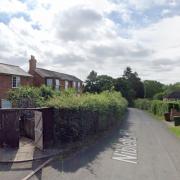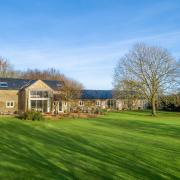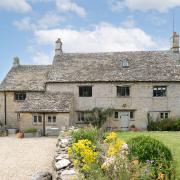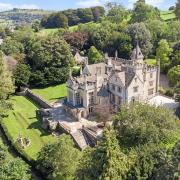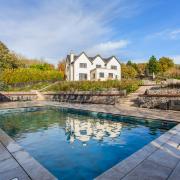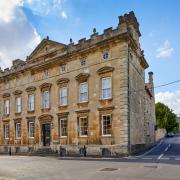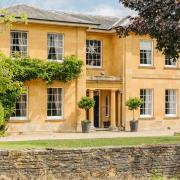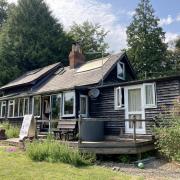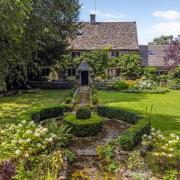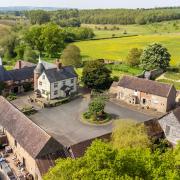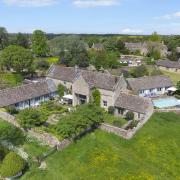Bourton-on-the-Water is not only a thriving tourist destinartion, it is also a vibrant place to live and work. Words and photography by Mark Child
When Roy Faiers started Cotswold Life in 1967, he said that he would 'seek to portray ... the true spirit of the Cotswolds and its people, both past and present'. Whilst it was clear that the present - a necessity if the new publication was to attract advertising - would be represented by items on fashion, shopping, motoring and eating out, it was equally clear that what appealed to much of the readership was the past. The letters page carried responses from readers who recognised the magazine as being a means of setting this down. 'Before it is lost forever' was the kind of phrase that correspondents regularly used.
In those days, kindly relatives sent occasional copies of the magazine to Cotswold ex-patriots living abroad, and Roy Faiers, with an eye to overseas subscriptions, published their letters of appreciation. These letters were packed with nuggets of local and family history, and, over the years, built up into the kind of melange of minutia that is gold-dust to researchers. There isn't nearly so much of that now; we live in an age when matters of the moment are of greater value than matters of the past. Which is why, after my piece about Bourton-on-the-Water appeared in March, I was pleased to receive an e-mail from a Cotswold Life subscriber living near Vancouver in Canada.
Bob Ransford, whose family emigrated at the end of the 19th century after hundreds of years living in the Cotswolds, had seen the photographs of the Lloyd's Bank building in Bourton. He said that his great-great-grandfather and his great-grandfather were both born there, when the bank building was a private house, which the Ransford family called 'The Shrubbery'. Bob's great-great grandmother 'had a wonderful walled garden next to the home where once the Lloyd's car park stood, and which is now occupied by a smaller, recently constructed commercial building.' The family were Baptists, and Bob's direct Ransford ancestors, dating back to the mid-17th century, are buried in the burial ground by the Old Baptist meeting hall off Church Street, Tewkesbury. In the early 17th century, one of these, William Ransford, owned what is now Gubshill Manor outside Tewkesbury.
I mention this partly because I believe that any useful information for someone's local history research should be 'saved' rather than 'lost'; partly because it is an example of the distance that Cotswold Life's subscriptions travel; and partly because I am once again back in Bourton-on-the-Water. It is early summer, the weather is unseasonably good, and the place is crowded. All around the River Windrush, Bourton-on-the-Water has spruced up for the new season, the street-level blandishments of its present now crowding out the fabric of its past. Its ice-cream sellers have gone into overdrive; its restaurants and caf�s are brimming; its car park is full.
Two young women on horseback saunter along its main street, apparently oblivious to the crowds and the traffic, and turn left across the little road bridge in front of the Cotswold Motoring Museum. Ahead of them, is a more residential Bourton, then the pastoral peace of open countryside. Behind them, the eager sightseers perambulate from one attraction to another; it is the thing to do. Bourton is small enough for people to take in everything, and small enough also to make them feel that they should. It is improbable to go to Bourton and not see the world-famous model village. But then, the village itself is known all over the world.
Too much is made of tourism here, I am told by residents who would have you know that this is also an expanding, residential village. That is certainly the case, but you just know that the families marking out their picnic territory on the wide grass verges beside the River Windrush are from anywhere but Bourton. The little somnambulate groups that criss-cross the low bridges between the several tourist attractions are the financial glue that holds together the village's economy. And, Bourton knows this. It passed the point of no return many decades ago, and it would be impossible now to take back its village from the summer crowds. And why would anyone want to, when there is so much to see, so much to walk around, and the River Windrush in which to soak weary legs and tired feet.
A quarter of a century ago, the writer and television presenter Tom Vernon came to Bourton-on-the-Water and wrote about it in his wonderfully entertaining H.V. Morton-style travelogue Fat Man On A Roman Road. He found the visitors very much as they present today. 'They sat on the grass', he wrote, 'they ate ice-creams, they paddled in the brook, they walked over the rustic bridges, and when they had done that they walked back again: most of them were enjoying themselves with such decorum and solemnity that it was difficult to be sure that they were enjoying themselves at all.' I love that sentence, and I offer it to you because I cannot think of any better description of the way in which visitors continue to behave at Bourton.
After an indifferent spring for trading, on the back of an exceptionally poor winter and a previous mid-year that saw some of the place put temporarily out of action, the village's traders hope that they will be able to take heart from the crowds on the grass in early summer. In a way, Bourton is as much about its access to the shallow river that runs through its main street as it is about its tourist attractions and the shops that line both sides of the road. Just as there is nothing like messing about in boats, there is very little to compare with the banks of the Windrush, here shaded by mature trees, and turned into Bournemouth beach in high summer.
In the last few months, a number of new independent retailers have set up in the place. In consequence of this, a blush of new signage - albeit always discreet hereabouts - has gone up, giving Bourton a welcome air of rejuvenation.
It is good to see that, following the sudden closure of the NPI Media Group's Nonsuch Bookshop, this has now been taken over by a completely different organisation and re-opened. Booksellers Limited have the place now, and what a wonderful shop it is, which seems to go on forever. The new owners acquired the existing stock and, as I write this at the beginning of June, have discounted a considerable number of Tempus and Nonsuch titles. The building is a lovely old place, and at the rear, there is a beautiful courtyard garden, not open to the public. Should the new owners consider it worthwhile to shoehorn a little high-class coffee shop with home-made scones and cakes into one of the rooms, and were planning permission granted, this courtyard could become the most attractive eating area in the town.
Back in the early '80s, Tom Vernon interviewed and wrote about just one Bourton trader - perfumer John Stephen - whom he called 'a simple English nose'. I first wrote about John in 1986, and again - for Cotswold Life - in 1998, and it is a delight to know that he is there still. His family came to Bourton in 1965; John took over the business from his father, nine years later. He has since developed one of the town's great tourist attractions, whilst at the same time successfully creating, manufacturing and marketing those most complex and personal of products, a range of perfumes. The Nose is still at work, continually creating fine perfumes; the perfumed garden at the rear has reached an attractive maturity; and these days, John offers two extraordinarily popular one-day perfume courses where people can create their own fragrances.
Bourton-on-the-Water is full of visitor attractions (see Cotswold Life March 2008 for the latest roundup of what is on offer), and is packed with independent retailers offering a huge range of delights. Here is just a taste of trade in the town, and some of the people who provide it.
When Roy Faiers started Cotswold Life in 1967, he said that he would 'seek to portray ... the true spirit of the Cotswolds and its people, both past and present'. Whilst it was clear that the present - a necessity if the new publication was to attract advertising - would be represented by items on fashion, shopping, motoring and eating out, it was equally clear that what appealed to much of the readership was the past. The letters page carried responses from readers who recognised the magazine as being a means of setting this down. 'Before it is lost forever' was the kind of phrase that correspondents regularly used.
In those days, kindly relatives sent occasional copies of the magazine to Cotswold ex-patriots living abroad, and Roy Faiers, with an eye to overseas subscriptions, published their letters of appreciation. These letters were packed with nuggets of local and family history, and, over the years, built up into the kind of melange of minutia that is gold-dust to researchers. There isn't nearly so much of that now; we live in an age when matters of the moment are of greater value than matters of the past. Which is why, after my piece about Bourton-on-the-Water appeared in March, I was pleased to receive an e-mail from a Cotswold Life subscriber living near Vancouver in Canada.
Bob Ransford, whose family emigrated at the end of the 19th century after hundreds of years living in the Cotswolds, had seen the photographs of the Lloyd's Bank building in Bourton. He said that his great-great-grandfather and his great-grandfather were both born there, when the bank building was a private house, which the Ransford family called 'The Shrubbery'. Bob's great-great grandmother 'had a wonderful walled garden next to the home where once the Lloyd's car park stood, and which is now occupied by a smaller, recently constructed commercial building.' The family were Baptists, and Bob's direct Ransford ancestors, dating back to the mid-17th century, are buried in the burial ground by the Old Baptist meeting hall off Church Street, Tewkesbury. In the early 17th century, one of these, William Ransford, owned what is now Gubshill Manor outside Tewkesbury.
I mention this partly because I believe that any useful information for someone's local history research should be 'saved' rather than 'lost'; partly because it is an example of the distance that Cotswold Life's subscriptions travel; and partly because I am once again back in Bourton-on-the-Water. It is early summer, the weather is unseasonably good, and the place is crowded. All around the River Windrush, Bourton-on-the-Water has spruced up for the new season, the street-level blandishments of its present now crowding out the fabric of its past. Its ice-cream sellers have gone into overdrive; its restaurants and caf�s are brimming; its car park is full.
Two young women on horseback saunter along its main street, apparently oblivious to the crowds and the traffic, and turn left across the little road bridge in front of the Cotswold Motoring Museum. Ahead of them, is a more residential Bourton, then the pastoral peace of open countryside. Behind them, the eager sightseers perambulate from one attraction to another; it is the thing to do. Bourton is small enough for people to take in everything, and small enough also to make them feel that they should. It is improbable to go to Bourton and not see the world-famous model village. But then, the village itself is known all over the world.
Too much is made of tourism here, I am told by residents who would have you know that this is also an expanding, residential village. That is certainly the case, but you just know that the families marking out their picnic territory on the wide grass verges beside the River Windrush are from anywhere but Bourton. The little somnambulate groups that criss-cross the low bridges between the several tourist attractions are the financial glue that holds together the village's economy. And, Bourton knows this. It passed the point of no return many decades ago, and it would be impossible now to take back its village from the summer crowds. And why would anyone want to, when there is so much to see, so much to walk around, and the River Windrush in which to soak weary legs and tired feet.
A quarter of a century ago, the writer and television presenter Tom Vernon came to Bourton-on-the-Water and wrote about it in his wonderfully entertaining H.V. Morton-style travelogue Fat Man On A Roman Road. He found the visitors very much as they present today. 'They sat on the grass', he wrote, 'they ate ice-creams, they paddled in the brook, they walked over the rustic bridges, and when they had done that they walked back again: most of them were enjoying themselves with such decorum and solemnity that it was difficult to be sure that they were enjoying themselves at all.' I love that sentence, and I offer it to you because I cannot think of any better description of the way in which visitors continue to behave at Bourton.
After an indifferent spring for trading, on the back of an exceptionally poor winter and a previous mid-year that saw some of the place put temporarily out of action, the village's traders hope that they will be able to take heart from the crowds on the grass in early summer. In a way, Bourton is as much about its access to the shallow river that runs through its main street as it is about its tourist attractions and the shops that line both sides of the road. Just as there is nothing like messing about in boats, there is very little to compare with the banks of the Windrush, here shaded by mature trees, and turned into Bournemouth beach in high summer.
In the last few months, a number of new independent retailers have set up in the place. In consequence of this, a blush of new signage - albeit always discreet hereabouts - has gone up, giving Bourton a welcome air of rejuvenation.
It is good to see that, following the sudden closure of the NPI Media Group's Nonsuch Bookshop, this has now been taken over by a completely different organisation and re-opened. Booksellers Limited have the place now, and what a wonderful shop it is, which seems to go on forever. The new owners acquired the existing stock and, as I write this at the beginning of June, have discounted a considerable number of Tempus and Nonsuch titles. The building is a lovely old place, and at the rear, there is a beautiful courtyard garden, not open to the public. Should the new owners consider it worthwhile to shoehorn a little high-class coffee shop with home-made scones and cakes into one of the rooms, and were planning permission granted, this courtyard could become the most attractive eating area in the town.
Back in the early '80s, Tom Vernon interviewed and wrote about just one Bourton trader - perfumer John Stephen - whom he called 'a simple English nose'. I first wrote about John in 1986, and again - for Cotswold Life - in 1998, and it is a delight to know that he is there still. His family came to Bourton in 1965; John took over the business from his father, nine years later. He has since developed one of the town's great tourist attractions, whilst at the same time successfully creating, manufacturing and marketing those most complex and personal of products, a range of perfumes. The Nose is still at work, continually creating fine perfumes; the perfumed garden at the rear has reached an attractive maturity; and these days, John offers two extraordinarily popular one-day perfume courses where people can create their own fragrances.
Bourton-on-the-Water is full of visitor attractions (see Cotswold Life March 2008 for the latest roundup of what is on offer), and is packed with independent retailers offering a huge range of delights. Here is just a taste of trade in the town, and some of the people who provide it.



